Luther Library
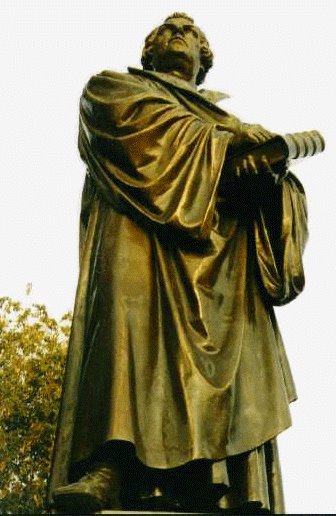
31 January 2006
Luther vs. Luther
 About six months ago, or so, I had the good fortune of getting a copy of the movie Martin Luther. It was originally produced and shown 1953 and was actually nominated for some Academy Awards (I'm not sure it won any of them, though). From what I understand (according the extra stuff on the DVD) it was quite the "barn burner" of a movie, it even got banned in a couple cites for various and assundry reasons.
About six months ago, or so, I had the good fortune of getting a copy of the movie Martin Luther. It was originally produced and shown 1953 and was actually nominated for some Academy Awards (I'm not sure it won any of them, though). From what I understand (according the extra stuff on the DVD) it was quite the "barn burner" of a movie, it even got banned in a couple cites for various and assundry reasons.
I saw it for the first time when I was in confirmation class. It was a "reward" of sorts. I don't remember if I liked it the first time I saw it, I probably didn't — proably wasn't enough violence or something, but I remember seeing it. I got the movie on DVD quite by accident, or perhaps providence, either way it was a nice "surprise."
It had been a return and for some reason, I'm not sure why, we couldn't send it back to a publisher or distributor, so, it was put into the break room for any who wanted it. I wanted it.
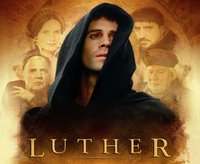 Today, after work, I went to BestBuy and roamed around for a while. I found the newer Luther movie (with Joseph Fiennes — if only Luther looked so good, huh?) for $9.99. I thought that was a pretty good deal, so I snagged it.
Today, after work, I went to BestBuy and roamed around for a while. I found the newer Luther movie (with Joseph Fiennes — if only Luther looked so good, huh?) for $9.99. I thought that was a pretty good deal, so I snagged it.
Both movies are good. I like them both, but I think I like the 1960 version better than the newer version. The simple reason is this: Though, it is long, the necessary "back story" and theology is behind it. The newer version, though exciting and packed with stars does leave a little to be desired. It is more adventure film then anything else. The Fiennes' Luther is much more fancy than the 1953 Luther, though.
The extra diddies on the 1953 Luther are much more interesting. There is a nice "documentary," if you will, that talks about the controversy the film created when it was released and, like I said, it was bannded (I think it was in Chicago, actually, but I could be wrong). The extras on the Fiennes' Luther are your basic Hollywood how-we-did-it with the requisite "star interviews." Though, interesting they do leave something to be desired.
Also, the Fiennes' Luther is a little overdone. The customes are fantastic, but I think the "period pieceness" of the production takes away from what little Luther there is. The 1953 version is much more "gritty" and that might be partly because of the black and white picture, but there is something "more," if you get my meaning.
Here is a review for the 1953 version. And here is a review for the Fiennes' Luther.
I wonder if any of the Pastors in the library use either one of these movies in the confirmation classes? And if so, how do they use it?
Peace and blessings to all.
Feedback
 About six months ago, or so, I had the good fortune of getting a copy of the movie Martin Luther. It was originally produced and shown 1953 and was actually nominated for some Academy Awards (I'm not sure it won any of them, though). From what I understand (according the extra stuff on the DVD) it was quite the "barn burner" of a movie, it even got banned in a couple cites for various and assundry reasons.
About six months ago, or so, I had the good fortune of getting a copy of the movie Martin Luther. It was originally produced and shown 1953 and was actually nominated for some Academy Awards (I'm not sure it won any of them, though). From what I understand (according the extra stuff on the DVD) it was quite the "barn burner" of a movie, it even got banned in a couple cites for various and assundry reasons.I saw it for the first time when I was in confirmation class. It was a "reward" of sorts. I don't remember if I liked it the first time I saw it, I probably didn't — proably wasn't enough violence or something, but I remember seeing it. I got the movie on DVD quite by accident, or perhaps providence, either way it was a nice "surprise."
It had been a return and for some reason, I'm not sure why, we couldn't send it back to a publisher or distributor, so, it was put into the break room for any who wanted it. I wanted it.
 Today, after work, I went to BestBuy and roamed around for a while. I found the newer Luther movie (with Joseph Fiennes — if only Luther looked so good, huh?) for $9.99. I thought that was a pretty good deal, so I snagged it.
Today, after work, I went to BestBuy and roamed around for a while. I found the newer Luther movie (with Joseph Fiennes — if only Luther looked so good, huh?) for $9.99. I thought that was a pretty good deal, so I snagged it.Both movies are good. I like them both, but I think I like the 1960 version better than the newer version. The simple reason is this: Though, it is long, the necessary "back story" and theology is behind it. The newer version, though exciting and packed with stars does leave a little to be desired. It is more adventure film then anything else. The Fiennes' Luther is much more fancy than the 1953 Luther, though.
The extra diddies on the 1953 Luther are much more interesting. There is a nice "documentary," if you will, that talks about the controversy the film created when it was released and, like I said, it was bannded (I think it was in Chicago, actually, but I could be wrong). The extras on the Fiennes' Luther are your basic Hollywood how-we-did-it with the requisite "star interviews." Though, interesting they do leave something to be desired.
Also, the Fiennes' Luther is a little overdone. The customes are fantastic, but I think the "period pieceness" of the production takes away from what little Luther there is. The 1953 version is much more "gritty" and that might be partly because of the black and white picture, but there is something "more," if you get my meaning.
Here is a review for the 1953 version. And here is a review for the Fiennes' Luther.
I wonder if any of the Pastors in the library use either one of these movies in the confirmation classes? And if so, how do they use it?
Peace and blessings to all.
Feedback
28 January 2006
Lutheran Carnival
Lutheran Carnival XVI, hosted by the Terrible Swede includes biographical information (be still, my beating librarian's heart!) about Norwegian Lutheran mathematician Niels Henrik Abel and several enlightening posts from various parts of the confessional Lutheran blogosphere.
Lutheran Carnival XVI, hosted by the Terrible Swede includes biographical information (be still, my beating librarian's heart!) about Norwegian Lutheran mathematician Niels Henrik Abel and several enlightening posts from various parts of the confessional Lutheran blogosphere.
27 January 2006
Churches ad hoc
We've all seen dozens of ways in which people (mis-) handle a camera. Over- and underexposure, speed blurs, red eyes, and the like — who among us hasn't shot a few rolls (or memory cards) full of garbage through the years. Even the best photographers produce an awful lot they'd never show anyone (that's why the best photographers develop and process their own work).
Many's the time we've not checked the background carefully enough and ended up with a tree growing out of Aunt Marge's head or produced some other unintended juxtaposition. Yet in the hands of a photographer with a witty spirit and a whimsical eye, the camera can record the artist's intentional juxtapositions.
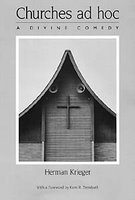 One such master is Herman Krieger, whose captioned photos record the interplay of religious edifaces and sacred symbols with their profane and secular surroundings. The resulting collection, bound and published as Churches ad hoc: A Divine Comedy, began with one photograph. Realizing a good thing, Krieger kept his eyes open, always examining the odd angle, carefully choosing his shots and just as carefully devising his captions.
One such master is Herman Krieger, whose captioned photos record the interplay of religious edifaces and sacred symbols with their profane and secular surroundings. The resulting collection, bound and published as Churches ad hoc: A Divine Comedy, began with one photograph. Realizing a good thing, Krieger kept his eyes open, always examining the odd angle, carefully choosing his shots and just as carefully devising his captions.
Ah, the captions. Lots of people can take good pictures. Many others can write clever prose. Krieger manages to to both, and in so doing tickle our fancy while occasionally also leading to deeper pondering. Christians viewing the 80+ captioned photos may be surprised to discover that Herman is a non-practicing Jew, while Jews who've looked through the book will say, "Of course he's Jewish — I could tell right away." This comes from his knowledge of and respect for the Old and New Testament Scriptures, which form the basis of most of his captions.
Who might enjoy this slim volume? Krieger's introduction provides the clues: "Excerpts ... have appeared in ... the Internet edition of The New York Times, a Methodist church calendar, a rock band cassette cover, the religion page of the Stockholm Svenska Dagbladet newspaper, and a Cornell Law School poster for a national conference on The Constitution and Religion: Theory and Practice."
Still unsure? Herman Krieger has that covered. Many of the photos appear online, so you can view them for yourself. If you like them, you can order online (including Amazon) or check your local bookseller. Then you can email Mr. Krieger and tell him what you think.
Recommended for those who like what they've seen so far.
Feedback
We've all seen dozens of ways in which people (mis-) handle a camera. Over- and underexposure, speed blurs, red eyes, and the like — who among us hasn't shot a few rolls (or memory cards) full of garbage through the years. Even the best photographers produce an awful lot they'd never show anyone (that's why the best photographers develop and process their own work).
Many's the time we've not checked the background carefully enough and ended up with a tree growing out of Aunt Marge's head or produced some other unintended juxtaposition. Yet in the hands of a photographer with a witty spirit and a whimsical eye, the camera can record the artist's intentional juxtapositions.
 One such master is Herman Krieger, whose captioned photos record the interplay of religious edifaces and sacred symbols with their profane and secular surroundings. The resulting collection, bound and published as Churches ad hoc: A Divine Comedy, began with one photograph. Realizing a good thing, Krieger kept his eyes open, always examining the odd angle, carefully choosing his shots and just as carefully devising his captions.
One such master is Herman Krieger, whose captioned photos record the interplay of religious edifaces and sacred symbols with their profane and secular surroundings. The resulting collection, bound and published as Churches ad hoc: A Divine Comedy, began with one photograph. Realizing a good thing, Krieger kept his eyes open, always examining the odd angle, carefully choosing his shots and just as carefully devising his captions.Ah, the captions. Lots of people can take good pictures. Many others can write clever prose. Krieger manages to to both, and in so doing tickle our fancy while occasionally also leading to deeper pondering. Christians viewing the 80+ captioned photos may be surprised to discover that Herman is a non-practicing Jew, while Jews who've looked through the book will say, "Of course he's Jewish — I could tell right away." This comes from his knowledge of and respect for the Old and New Testament Scriptures, which form the basis of most of his captions.
Who might enjoy this slim volume? Krieger's introduction provides the clues: "Excerpts ... have appeared in ... the Internet edition of The New York Times, a Methodist church calendar, a rock band cassette cover, the religion page of the Stockholm Svenska Dagbladet newspaper, and a Cornell Law School poster for a national conference on The Constitution and Religion: Theory and Practice."
Still unsure? Herman Krieger has that covered. Many of the photos appear online, so you can view them for yourself. If you like them, you can order online (including Amazon) or check your local bookseller. Then you can email Mr. Krieger and tell him what you think.
Churches ad hoc: a divine comedy
Soft cover, 96 pages | 86 duotone photographs
ISBN 0966580966 | $14.95
Recommended for those who like what they've seen so far.
Feedback
Lutheran Carnival Deadline Looms
Submissions are due this (Friday) evening at 7:00 p.m. CST for the Lutheran Carnival. Make sure you have the proper format before sending to lutherancarnival AT gmail DOT com.
The Terrible Swede hosts.
Submissions are due this (Friday) evening at 7:00 p.m. CST for the Lutheran Carnival. Make sure you have the proper format before sending to lutherancarnival AT gmail DOT com.
The Terrible Swede hosts.
26 January 2006
Lutheran Book of Prayer
 This is an updated revision of a classic. The Lutheran Book of Prayer has been on the book shelf of many faithful Missouri Synod Lutherans for decades, as a valuable resource for regular and occasional prayer.
This is an updated revision of a classic. The Lutheran Book of Prayer has been on the book shelf of many faithful Missouri Synod Lutherans for decades, as a valuable resource for regular and occasional prayer.
There are a few strengths of this edition, compared to the previous edition. The styling of the book design itself is more elegant than the 1970 edition. As has been noted elsewhere, the colour scheme is consistent with the new Lutheran Service Book, the Concordia ESV Pew Bible, and the newest revision of the Small Catechism with Explanation (1991 Translation). The typeface is a little easier on the eyes.
But where the improvement is most clearly noted is in the prayers made available to the reader. The daily prayers are a little more useful, in my opinion, than those in the previous edition. The occasional prayers cover a slightly wider net of experiences. The inclusion, in bits and pieces, of most of the Small Catechism, including the Table of Duties, a few short psalm selections, and the Nicene and Athanasian Creeds also make this a resource for more than just occasional prayers.
This book is a welcome resource for the Lutheran home, centred as it is on the Word of God and our response, in prayer, to that Word. It is designed to be in the hands of the everyday Christian, not just pastors or professional church workers.
ISBN:0758608594
264 pp, hardcover
Concordia Publishing House, 2005
Highly recommended to all.
Feedback
 This is an updated revision of a classic. The Lutheran Book of Prayer has been on the book shelf of many faithful Missouri Synod Lutherans for decades, as a valuable resource for regular and occasional prayer.
This is an updated revision of a classic. The Lutheran Book of Prayer has been on the book shelf of many faithful Missouri Synod Lutherans for decades, as a valuable resource for regular and occasional prayer.There are a few strengths of this edition, compared to the previous edition. The styling of the book design itself is more elegant than the 1970 edition. As has been noted elsewhere, the colour scheme is consistent with the new Lutheran Service Book, the Concordia ESV Pew Bible, and the newest revision of the Small Catechism with Explanation (1991 Translation). The typeface is a little easier on the eyes.
But where the improvement is most clearly noted is in the prayers made available to the reader. The daily prayers are a little more useful, in my opinion, than those in the previous edition. The occasional prayers cover a slightly wider net of experiences. The inclusion, in bits and pieces, of most of the Small Catechism, including the Table of Duties, a few short psalm selections, and the Nicene and Athanasian Creeds also make this a resource for more than just occasional prayers.
This book is a welcome resource for the Lutheran home, centred as it is on the Word of God and our response, in prayer, to that Word. It is designed to be in the hands of the everyday Christian, not just pastors or professional church workers.
ISBN:0758608594
264 pp, hardcover
Concordia Publishing House, 2005
Highly recommended to all.
Feedback
Handling the Word of Truth by John T. Pless
Originally posted on Necessary Roughness on June 9, 2005.
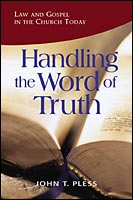 I ordered Handling the Word of Truth: Law and Gospel in the Church Today by John T. Pless. Others have had good things to say about Pless's other books, so I would try this one.
I ordered Handling the Word of Truth: Law and Gospel in the Church Today by John T. Pless. Others have had good things to say about Pless's other books, so I would try this one.
The book, 128 pages in 13 chapters and an appendix, contains snippets from Martin Luther and C.F.W. Walther, expanded in modern English. Biblical scripture is organized into Old and New Testaments, but intermingled in both are portions of God's law and His Gospel. It is important for a Christian to tell the difference and not mingle the two, because God's Law shows us what we are to do, and the Gospel shows what He has done for us.
If a little Law is mixed in with the Gospel, then the message becomes, "What do we do to earn salvation?" This was a common grievance by Luther of the Roman Catholic Church during the Reformation, and some have mentioned that it is a fault of the theology behind popular books such as The Purpose Driven Life. If some Gospel is mixed in with the Law, then the message becomes "Even though I have broken God's law, the Holy Spirit cannot leave me and I cannot fall into God's wrath." This blunting of sin's condemnation is an objection of some Calvinists by Walther.
Because Lutherans believe that salvation is acquired by no work of man, there has always been the criticism of "cheap grace" or licentiousness. This comes from not understanding the dual nature of God's Word. If one believes the Gospel and has faith in their salvation purchased by Christ, one wants to do good and follow God's law.
Scripture is cited so much in this book that it would have been difficult to read all the references if I didn't have the Bible on PDA. This is a good book for an Adult Sunday School class, where a Pastor can assign the passages in each chapter among a group of people.
This book divulged some interesting things about preaching. C.F.W. Walther taught pastors that when someone is secure in their sin, or secure that they are pious by their own deeds, the Law should be preached to them, to warn them that their security is unwarranted and to inform them of the coming Judgment. After they realize how bad they really are, the Gospel should be preached to them that they may believe and be saved. If Law is preached to the already insecure, a person may despair and think they will never go to heaven. If Gospel is preached to the secure, a person won't take it seriously, and continue unaware of the consequences of their disbelief and error.
Despite the theological heaviness of the issues, Pless writes well and toward the mature Christian. He doesn't use the big words saved for theological academia, like "eschatology" and "exegesis". I do recommend this book for Adult Bible Classes as well as anyone concerned with what is required to gain entry into Heaven. I enjoyed the book and found the book's challenge of perceptions informative.
Highly recommended for those interested in analyzing what is being said from the pulpit.
Feedback
Originally posted on Necessary Roughness on June 9, 2005.
 I ordered Handling the Word of Truth: Law and Gospel in the Church Today by John T. Pless. Others have had good things to say about Pless's other books, so I would try this one.
I ordered Handling the Word of Truth: Law and Gospel in the Church Today by John T. Pless. Others have had good things to say about Pless's other books, so I would try this one.The book, 128 pages in 13 chapters and an appendix, contains snippets from Martin Luther and C.F.W. Walther, expanded in modern English. Biblical scripture is organized into Old and New Testaments, but intermingled in both are portions of God's law and His Gospel. It is important for a Christian to tell the difference and not mingle the two, because God's Law shows us what we are to do, and the Gospel shows what He has done for us.
If a little Law is mixed in with the Gospel, then the message becomes, "What do we do to earn salvation?" This was a common grievance by Luther of the Roman Catholic Church during the Reformation, and some have mentioned that it is a fault of the theology behind popular books such as The Purpose Driven Life. If some Gospel is mixed in with the Law, then the message becomes "Even though I have broken God's law, the Holy Spirit cannot leave me and I cannot fall into God's wrath." This blunting of sin's condemnation is an objection of some Calvinists by Walther.
Because Lutherans believe that salvation is acquired by no work of man, there has always been the criticism of "cheap grace" or licentiousness. This comes from not understanding the dual nature of God's Word. If one believes the Gospel and has faith in their salvation purchased by Christ, one wants to do good and follow God's law.
Scripture is cited so much in this book that it would have been difficult to read all the references if I didn't have the Bible on PDA. This is a good book for an Adult Sunday School class, where a Pastor can assign the passages in each chapter among a group of people.
This book divulged some interesting things about preaching. C.F.W. Walther taught pastors that when someone is secure in their sin, or secure that they are pious by their own deeds, the Law should be preached to them, to warn them that their security is unwarranted and to inform them of the coming Judgment. After they realize how bad they really are, the Gospel should be preached to them that they may believe and be saved. If Law is preached to the already insecure, a person may despair and think they will never go to heaven. If Gospel is preached to the secure, a person won't take it seriously, and continue unaware of the consequences of their disbelief and error.
Despite the theological heaviness of the issues, Pless writes well and toward the mature Christian. He doesn't use the big words saved for theological academia, like "eschatology" and "exegesis". I do recommend this book for Adult Bible Classes as well as anyone concerned with what is required to gain entry into Heaven. I enjoyed the book and found the book's challenge of perceptions informative.
Highly recommended for those interested in analyzing what is being said from the pulpit.
Feedback
25 January 2006
The Small Catechism
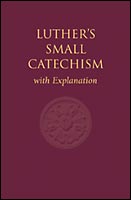 When most Lutherans think about being Lutheran, responding, "This is most certainly true," is one of the first distinctives that comes to mind. The beginning of this new book review blog thus seems the right place and time to offer comments on the new edition of the Small Catechism from Concordia Publishing House.
When most Lutherans think about being Lutheran, responding, "This is most certainly true," is one of the first distinctives that comes to mind. The beginning of this new book review blog thus seems the right place and time to offer comments on the new edition of the Small Catechism from Concordia Publishing House.
This is no new translation but an update of the 1991 edition. Many of the internal and external differences are visual. First, we see the cover, where you'll notice that burgundy is the new blue in the LCMS. This matches the CPH printing of the ESV Bible, the 2005 edition of the Lutheran Book of Prayer, the upcoming Lutheran Service Book, and other current and pending titles. Besides this external unity, we rejoice in seeing how the Small Catechism is being incorporated into these and other books coming out of CPH. The embossed Luther Seal gives even the basic edition a rich feel.
The second visual difference in this new printing involves the illustrations found throughout the volume. Each of the Six Chief Parts, the Daily Prayers, the Table of Duties, and Christian Questions begins with a small drawing that both introduces the section and ties it to the other parts.
Regarding the print content, the Appendix has been expanded. All material from the "blue" 1991 edition remains, including Luther's Preface, the Books of the Bible, Creeds and Confessions, the Church Year, Index of Bible Quotations, and Index of Topics. The Church Year listing is supplemented with a pie chart to show the divisions. Additions include an Explanation of Luther's Seal, a Salvation Outline summarizing "basic information about the human condition and God's saving grace," Fifty Terms Relating to Worship and God's House, The Time between the Testaments (intertestamental history), and Symbols and Their Meanings, with an extensive collection of theological and liturgical graphics shown and explained.
The strengths and weaknesses of the Synodical Catechism otherwise remain. The largest portion of the book is still devoted to An Explanation of the Small Catechism, parts of which don't always fit neatly with the preceding confession of the Catechism proper. The ongoing confusion in the LCMS about the Office of the Holy Ministry and its relationship to Confession and the Office of the Keys still finds no resolution in complete harmony with the Small Catechism and the other Confessions. Sometimes I'm not sure about the choice of illustrative or proof texts. Overall, however, this section can be used profitably if we read with discernment. Also, the NIV translation remains, despite its many shortcomings.
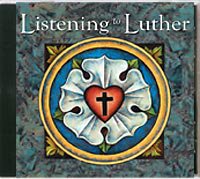 Finally, I'd like to touch again on the new catechetical emphasis we're seeing from CPH and the LCMS. As noted, the Six Chief Parts appear in a number of recent Concordia publications. In conjunction with reading the Catechism in print, I must remind readers of the recently released CD Listening to Luther, which was reviewed and recommended at Aardvark Alley back on the Reformer's 522nd birthday (10 November AD 2005).
Finally, I'd like to touch again on the new catechetical emphasis we're seeing from CPH and the LCMS. As noted, the Six Chief Parts appear in a number of recent Concordia publications. In conjunction with reading the Catechism in print, I must remind readers of the recently released CD Listening to Luther, which was reviewed and recommended at Aardvark Alley back on the Reformer's 522nd birthday (10 November AD 2005).
Ignorance of the Catechism is no excuse these days. This new version promises to be the same excellent devotional aid it's always been and the new resources and graphics only increase its didactic capabilities. We can hope that the coming years see an ever-increasing integration of visual and musical arts with our foundational texts.
Highly recommended for everyone.
Feedback
 When most Lutherans think about being Lutheran, responding, "This is most certainly true," is one of the first distinctives that comes to mind. The beginning of this new book review blog thus seems the right place and time to offer comments on the new edition of the Small Catechism from Concordia Publishing House.
When most Lutherans think about being Lutheran, responding, "This is most certainly true," is one of the first distinctives that comes to mind. The beginning of this new book review blog thus seems the right place and time to offer comments on the new edition of the Small Catechism from Concordia Publishing House.This is no new translation but an update of the 1991 edition. Many of the internal and external differences are visual. First, we see the cover, where you'll notice that burgundy is the new blue in the LCMS. This matches the CPH printing of the ESV Bible, the 2005 edition of the Lutheran Book of Prayer, the upcoming Lutheran Service Book, and other current and pending titles. Besides this external unity, we rejoice in seeing how the Small Catechism is being incorporated into these and other books coming out of CPH. The embossed Luther Seal gives even the basic edition a rich feel.
The second visual difference in this new printing involves the illustrations found throughout the volume. Each of the Six Chief Parts, the Daily Prayers, the Table of Duties, and Christian Questions begins with a small drawing that both introduces the section and ties it to the other parts.
Regarding the print content, the Appendix has been expanded. All material from the "blue" 1991 edition remains, including Luther's Preface, the Books of the Bible, Creeds and Confessions, the Church Year, Index of Bible Quotations, and Index of Topics. The Church Year listing is supplemented with a pie chart to show the divisions. Additions include an Explanation of Luther's Seal, a Salvation Outline summarizing "basic information about the human condition and God's saving grace," Fifty Terms Relating to Worship and God's House, The Time between the Testaments (intertestamental history), and Symbols and Their Meanings, with an extensive collection of theological and liturgical graphics shown and explained.
The strengths and weaknesses of the Synodical Catechism otherwise remain. The largest portion of the book is still devoted to An Explanation of the Small Catechism, parts of which don't always fit neatly with the preceding confession of the Catechism proper. The ongoing confusion in the LCMS about the Office of the Holy Ministry and its relationship to Confession and the Office of the Keys still finds no resolution in complete harmony with the Small Catechism and the other Confessions. Sometimes I'm not sure about the choice of illustrative or proof texts. Overall, however, this section can be used profitably if we read with discernment. Also, the NIV translation remains, despite its many shortcomings.
 Finally, I'd like to touch again on the new catechetical emphasis we're seeing from CPH and the LCMS. As noted, the Six Chief Parts appear in a number of recent Concordia publications. In conjunction with reading the Catechism in print, I must remind readers of the recently released CD Listening to Luther, which was reviewed and recommended at Aardvark Alley back on the Reformer's 522nd birthday (10 November AD 2005).
Finally, I'd like to touch again on the new catechetical emphasis we're seeing from CPH and the LCMS. As noted, the Six Chief Parts appear in a number of recent Concordia publications. In conjunction with reading the Catechism in print, I must remind readers of the recently released CD Listening to Luther, which was reviewed and recommended at Aardvark Alley back on the Reformer's 522nd birthday (10 November AD 2005).Ignorance of the Catechism is no excuse these days. This new version promises to be the same excellent devotional aid it's always been and the new resources and graphics only increase its didactic capabilities. We can hope that the coming years see an ever-increasing integration of visual and musical arts with our foundational texts.
Highly recommended for everyone.
Feedback
Staff Recruitment
Beyond email exchanges and IRC chat, Luther Library needed a place to discuss and assemble our working crew. Rather than reinvent the wheel, we've decided to use the existing forum of the Confessional Lutheran Blog Conference, the Google group formed in preparation for this year's pre-Symposia blog confab.
If you'd like to volunteer yourself or others, or discuss yourself or anyone else as a possible candidate, please either visit the group or send an email to the head librarian. Those wishing to participate anonymously (such as the Aardvark) will have their privacy wishes protected to the fullest extent possible. If you're unsure about talking in the open forum, please use only email.
If you'd like to volunteer yourself or others, or discuss yourself or anyone else as a possible candidate, please either visit the group or send an email to the head librarian. Those wishing to participate anonymously (such as the Aardvark) will have their privacy wishes protected to the fullest extent possible. If you're unsure about talking in the open forum, please use only email.
Life's Too Short to Read Bad Books
Blog Background and Submission Guidelines
 Conversations at the 2006 Theologcial Symposia triggered something in the Aardvark's fevered brain. His Brief Update from the Fort included mention of topical, confessional Lutheran, "multi-staffed specialty blogs," of which Luther Library is the first.
Conversations at the 2006 Theologcial Symposia triggered something in the Aardvark's fevered brain. His Brief Update from the Fort included mention of topical, confessional Lutheran, "multi-staffed specialty blogs," of which Luther Library is the first.
Luther Library exists in order to aid Christian readers, particularly confessional Lutheran church workers and lay people, in expanding their reading lists. Since we hope to assist a broad range of readers, we've recruited reviewers from a number of backgrounds. Their main common ground is that each holds a quia subscription to the Book of Concord.
Our original intent was to post several reviews each week. However, since all of us are engaged in various vocations demanding much of our time, the intervals have become longer than we initially desired. However, we're still plugging away.
We also apologize for a major communications glitch, wherein several review requests were accidentally shuttled to the wrong account, where they've been sitting for far too long. However, now that we've discovered the problem, we will try to rectify it.
We've decided that we'll present positive reviews and recommendations but will also include some sort of "banned book list," actually warnings to our readers concerning titles that could choke a goat. Actually, ASPCA, you need not worry; no real goats will be choked during the review process. However, when a reviewer strongly disagrees with the theology of a work, or when one of us claims to be drowing in turgid prose, we'll try, in the interest of fairness, to have another reviewer take a look.
Our desire is to be serious about our theology but, whenever possible, lighthearted in our presentation. As we go along, we'll invite readers to suggest books to be reviewed and will keep comments open so you can add let everyone know whether you think we're right or wrong. We're willing to look at everything from multi-volume tomes laden with footnotes to children's picture books.
We accept copies of published books, galleys, DVDs, and CDs. When you contact the library to suggest a print, video, or audio title, we'll provide mailing information. If you need the submitted item returned, we'll also tell you how to arrange that. We may also review web sites, so if you have what you believe is quality online content, let us know.
Even though we may suggest some weighty tomes, we try to keep the reviews short and sweet. We don't impose a rigid house style on our contributors, but we do ask them to choose brevity, proper grammar, and correct spelling in all their posts. Our in-house editors also drop in as needed to clean up and clarify posted reviews.
Now that you've studied our guidelines, if you have something that you think our people would like, please submit your request to the Library.
NOTE: Post modified on 7 November AD 2008.
 Conversations at the 2006 Theologcial Symposia triggered something in the Aardvark's fevered brain. His Brief Update from the Fort included mention of topical, confessional Lutheran, "multi-staffed specialty blogs," of which Luther Library is the first.
Conversations at the 2006 Theologcial Symposia triggered something in the Aardvark's fevered brain. His Brief Update from the Fort included mention of topical, confessional Lutheran, "multi-staffed specialty blogs," of which Luther Library is the first.Luther Library exists in order to aid Christian readers, particularly confessional Lutheran church workers and lay people, in expanding their reading lists. Since we hope to assist a broad range of readers, we've recruited reviewers from a number of backgrounds. Their main common ground is that each holds a quia subscription to the Book of Concord.
Our original intent was to post several reviews each week. However, since all of us are engaged in various vocations demanding much of our time, the intervals have become longer than we initially desired. However, we're still plugging away.
We also apologize for a major communications glitch, wherein several review requests were accidentally shuttled to the wrong account, where they've been sitting for far too long. However, now that we've discovered the problem, we will try to rectify it.
We've decided that we'll present positive reviews and recommendations but will also include some sort of "banned book list," actually warnings to our readers concerning titles that could choke a goat. Actually, ASPCA, you need not worry; no real goats will be choked during the review process. However, when a reviewer strongly disagrees with the theology of a work, or when one of us claims to be drowing in turgid prose, we'll try, in the interest of fairness, to have another reviewer take a look.
Our desire is to be serious about our theology but, whenever possible, lighthearted in our presentation. As we go along, we'll invite readers to suggest books to be reviewed and will keep comments open so you can add let everyone know whether you think we're right or wrong. We're willing to look at everything from multi-volume tomes laden with footnotes to children's picture books.
We accept copies of published books, galleys, DVDs, and CDs. When you contact the library to suggest a print, video, or audio title, we'll provide mailing information. If you need the submitted item returned, we'll also tell you how to arrange that. We may also review web sites, so if you have what you believe is quality online content, let us know.
Even though we may suggest some weighty tomes, we try to keep the reviews short and sweet. We don't impose a rigid house style on our contributors, but we do ask them to choose brevity, proper grammar, and correct spelling in all their posts. Our in-house editors also drop in as needed to clean up and clarify posted reviews.
Now that you've studied our guidelines, if you have something that you think our people would like, please submit your request to the Library.
NOTE: Post modified on 7 November AD 2008.
24 January 2006
